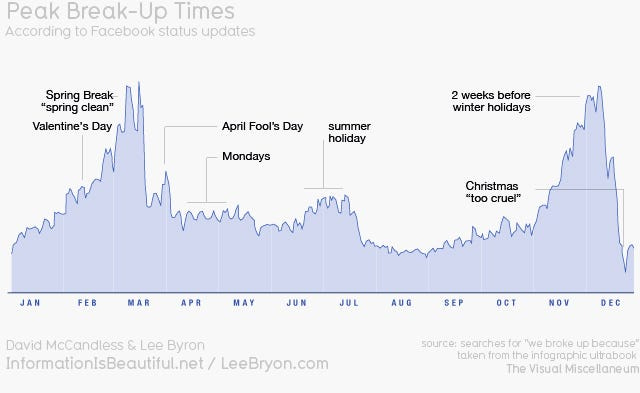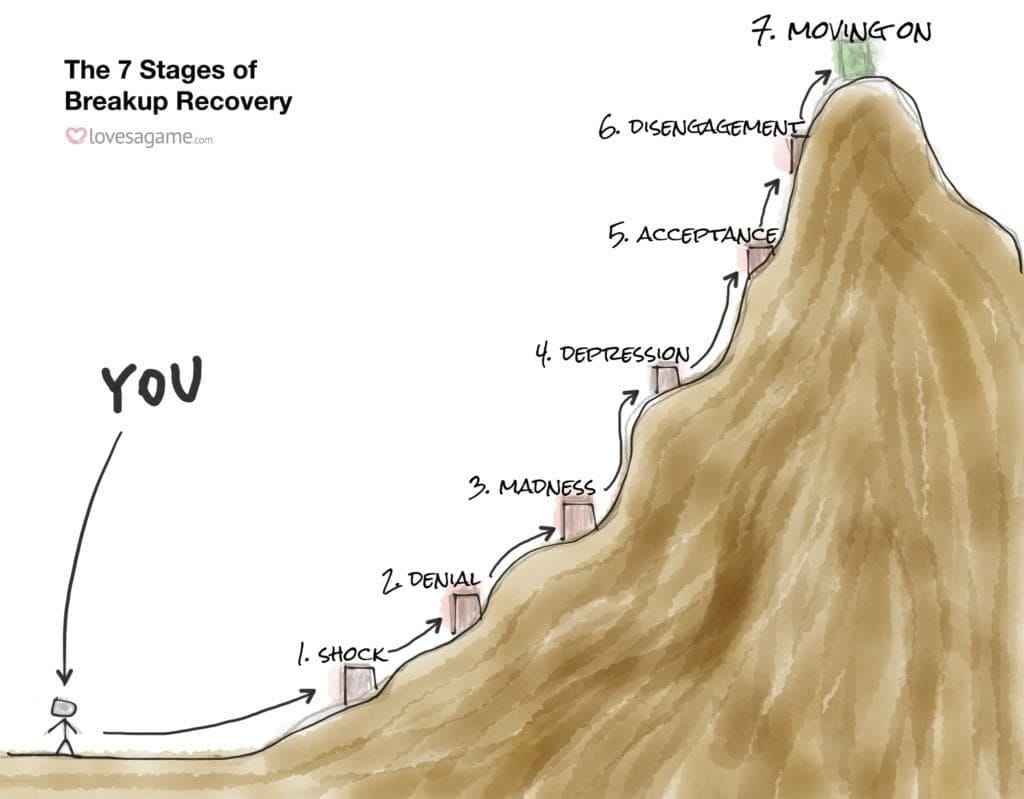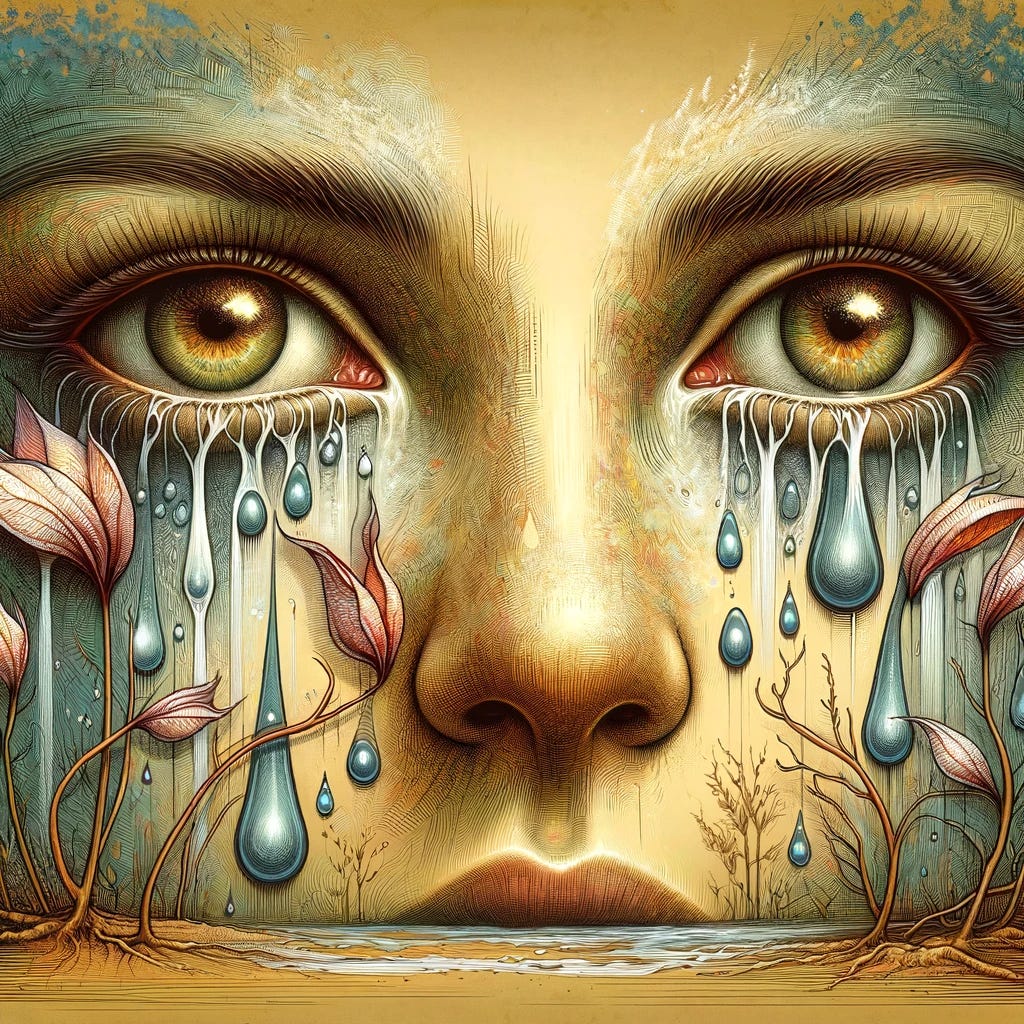Mistletoes and Misery: Surviving holiday heartbreak
In this heartfelt exploration, I venture into the icy grip of holiday breakups, offering a warm guide through the frosty journey of heartache to healing.
Ah, the holidays! That time of year draped in twinkling lights, the scent of cinnamon wafting through the air, and the warmth of shared joys. It’s a season synonymous with coziness, where hearts should be full of cheer. Yet, for some, it’s a paradoxical period where the glow of festive lights contrasts sharply with the chill of heartache. Yes, I’m talking about the all-too-common holiday breakups.
Recently, I’ve been witnessing this heartrending juxtaposition firsthand. My sister, after a seemingly blissful 2-year relationship, found herself on the harsh end of a breakup. The shock was profound, especially since engagement bells were almost audible in their near future.
As she navigates this painful maze, I find myself in a conflicting emotional space — preparing for my own wedding in 2 weeks. This juxtaposition brings a strange mix of emotions. It’s something akin to survivor’s guilt. How does someone balance the elation of personal romantic fulfillment with the empathetic pain of a loved one’s heartbreak?
In trying to understand and navigate these emotions, I turned to my therapist for insight. It turns out, the holiday season, contrary to its festive facade, is a peak time for relationships to unravel. Intrigued by this, I decided to delve deeper, exploring the why and how, and perhaps, more importantly, offering a guiding light to those trudging through this tough terrain right now.
As one of the 64% of Americans who’ve felt the sting of a breakup, I can relate on a deeply personal level. My own holiday heartbreaks range from teenage despair, where the world seemed to end at 16, to more adult miseries, where coping mechanisms included a mix of reckless decisions, an overindulgence in spirits (both liquid and musical), and a playlist heavily featuring Taylor Swift’s “Lover” album. Songs like “Cruel Summer” and “Death by a Thousand Cuts” were not just melodies but lifelines.
Yet, everyone’s healing journey is unique. The cocktail of emotions, support systems, and healing mechanisms varies widely. In the following sections, we’ll explore the underlying reasons for holiday breakups, share stories (including my own) of navigating these turbulent times, and most importantly, provide actionable advice to mend broken hearts. So whether it’s finding solace in music, seeking professional help, or simply understanding you’re not alone in this, we’ll cover it all.
Grab a cup of something warm, find a cozy spot, and let’s break down the breakup together. After all, the holiday season is about more than festivities. It’s often about finding light in the darkest of times.
 Tiktok failed to load.
Tiktok failed to load.Enable 3rd party cookies or use another browser
The why behind seasonal splits
It seems almost cruel, doesn’t it? The holiday season, with its romantic movies and mistletoe magic, sets the stage for love and warmth. Yet, ironically, it’s also the peak season for breakups, with December 11th marked as the most common day for relationships to end, closely followed by Valentine’s Day. This pattern is likely not mere happenstance. Rather, it suggests that the holidays serve as a critical juncture for relationships, a make-or-break period that prompts deep reflection on the paths our lives are taking.
For one, the holiday season, with all its cheer, can amplify stress. We often find ourselves with less patience as we juggle festive preparations, family dynamics, and financial pressures. This heightened stress can expose cracks in a relationship that might otherwise remain hidden. It’s a time when behaviors or habits that may be merely annoying during the rest of the year become intolerable under the holiday microscope.
April Davis, a matchmaker and founder of LUMA Luxury Matchmaking, points out that breaking up during the holidays can transform a season of celebration into one of mourning. But, she also argues that prolonging a relationship out of a desire not to “ruin” someone’s holiday is neither healthy nor considerate. Davis emphasizes that the best time to end a relationship is when you decide it’s over — versus dragging it out and wasting everyone’s time.
For those on the receiving end of a holiday breakup, there might be a silver lining. As harsh as the timing may seem, it prevents the forging of new memories and deeper commitments that would make a future breakup even more painful.
So, why do the holidays tend to bring relationships to a breaking point?
😰 Stress: The holidays are notoriously stressful, and this can lead to frayed tempers and misdirected anger. In fact, 8 in 10 Americans report increased stress during this season.
👪 Family dynamics: Increased family time can mean heightened pressures and judgments. Introducing a partner to family traditions or contemplating future holidays together can be daunting.
🪞 Reflection and projection: The holidays are a time for reflection on the past and envisioning the future. This introspection can lead to reevaluations of current relationships.
🌳 Desire for authenticity: Some may not want to fake it during such a family-focused time and prefer to spend it with those they feel most authentic with.
There are also the typical most common offenders. Most of which are amplified by these tailwinds. According to Psychology Today, reasons like bad behaviors, unsupportive partners, toxic influences, financial issues, poor communication, and infidelity drive most breakups.
For instance, just look at how hard Ben Stiller’s character tried to conceal his smoking from his girlfriend’s parents in the iconic film, “Meet the Parents”.
Interestingly, financial stress is another significant factor, with 38% of women expressing concern over holiday expenses. Additionally, cheating, a common reason for breakups, becomes more evident during this time too. Studies show that 13% of married women and 20% of married men have had affairs, and 69% of these marriages end due to an affair being discovered.
Understanding these dynamics is crucial. It’s useful as more than a justification for the breakup — more so, for contextualizing it. And while it’s natural to feel hurt and angry about the timing, recognizing the pressures of the season can help in processing these emotions more healthily. It endows a more objective view of the circumstances leading to the breakup.
In the end, though, no reason fully assuages the pain of a holiday breakup. It’s a complex interplay of emotions and circumstances unique to each individual. The key lies in navigating these turbulent waters with grace, understanding, and, most importantly, self-care.
Healing your heart post-breakup during the holidays
Enduring a breakup can be a harrowing process. It’s one often marked by a rollercoaster of emotions. It’s a time when you need to be extra gentle with yourself, embracing forgiveness and non-judgment.
Embrace Hope, But Give It Space
Hope can be a double-edged sword in the aftermath of a breakup. While it’s true that life is long and about 30% of couples give their relationship another try, it’s crucial to approach this possibility with caution.
Experts recommend giving the relationship about a month’s break before revisiting the idea of getting back together. This time allows for personal reflection and healing, which is vital whether you reunite or move on.
Acknowledge the Impermanence of Relationships
A staggering 94.3% of couples eventually part ways, but remember, about 1 in 20 relationships last a lifetime. This statistic isn’t meant to breed cynicism but rather to provide a realistic perspective. It’s a reminder that the blissful relationships you see around you are also subject to change and challenges.
Understand the Nature of Breakup Pain
Breakup pain can feel akin to drug withdrawal, and this isn’t just a metaphor. MRI scans have shown that losing a significant source of dopamine — like a beloved partner — can create a chemical imbalance in the brain, leading to real, physical pain.
No Contact Can Be Beneficial
37% of Americans believe in the “no contact” rule post-breakup. This method serves a dual purpose: it can either enhance the chances of your ex missing you or help you adjust to life without them. Cutting off contact helps in breaking the daily habit of including this person in your life.
Be Cautious with Post-Breakup Intimacy
While ⅓ of people find themselves getting intimate with their ex-post breakup, and 20% doing so multiple times, tread this path with caution. It can reopen old wounds or create new complications. This is especially true if you’re not emotionally prepared for the potential outcomes.
Self-Care is Paramount
Recognize that breakups can lead to physical symptoms like insomnia, intrusive thoughts, and even weakened immune function. Be kind to yourself. Focus on simple comforts like nutritious meals, relaxing activities, and maybe even a massage. Treat yourself with the same compassion you would offer a grieving friend.
Leverage Holiday Togetherness for Healing
The holiday season, with its inherent family gatherings, can actually be a boon for recovery. Your family, despite their quirks, offers a network of unconditional support. Use this time to lean on them, express your feelings, and perhaps find some humor in the shared experiences.
Cognitive Strategies for Moving On
A fascinating study involving 24 heartbroken individuals used different cognitive strategies to help them cope with breakups. These strategies included negatively reappraising the ex, accepting feelings of love as normal, and using distraction. The study found that while all 3 strategies reduced emotional responses to memories of the ex, only negative reappraisal decreased feelings of love. However, it also led to a worse mood in the short term.
Distraction, meanwhile, improved mood but didn’t decrease love feelings. Acceptance had no effect on love or mood but still helped dull emotional responses. Meaning, there are certainly strategies for coping. However, the only real way to get over it is through it.
Rediscovering Your Identity
Ultimately, the most effective path to recovery lies in rediscovering and reestablishing your own identity. Love, akin to other motivations like hunger or thirst, drives us towards a partner. When love is unrequited, it can leave us feeling lost and sad. The road back to self can be long and winding, but it’s also filled with potential for growth, self-discovery, and eventual contentment.
The holiday season, with its introspective quality and family support, might just be the perfect backdrop to start this journey. Remember, healing is never linear, and everyone’s process is unique. Be patient with yourself and know that with each passing day, you’re moving closer to a stronger, more centered version of yourself.
The phases of an emotional odyssey
Navigating through a breakup is akin to embarking on a tumultuous emotional odyssey. Just as you would grieve the loss of a loved one, the end of a significant relationship warrants a similar process.
After all, the person you shared your Sundays with, sought advice from, and created lifelong memories with is no longer a part of your everyday life. It’s a profound loss, and it’s natural to feel a sense of violation and betrayal.
On average, recovery from a breakup takes about 11 weeks. However, remember that healing is a deeply personal process, and its timeline varies greatly from one individual to another. But regardless, expect it to look a lot like grieving any other loss. As such, let’s explore the stages of grief specific to breakups, and how you can navigate them.
Phase 1: Shock
In the immediate aftermath, you’re hit with disbelief. How could someone you trusted so deeply cause such pain? These first few days are often the most challenging, filled with intense emotions. It’s essential during this phase to allow yourself to experience these feelings without self-blame or overanalyzing.
Phase 2: Denial
Next comes denial, often confused with hope. You might find yourself plotting ways to win back your ex. While there’s a chance of reconciliation, it’s important to stay grounded and focus on self-care. Redirect your energy into positive activities like exercise or reading.
Phase 3: Anger
Anger can be empowering in its own way, helping you regain a sense of self-worth. It’s a natural response to feeling wronged. Channel this energy constructively, and be careful not to project it onto others (at least as much as you can help it).
Phase 4: Bargaining
Bargaining is marked by thoughts of what could have been done differently. It’s a phase of grasping at straws, often fueled by vanity. Remember, true partnership doesn’t require you to compromise your core values.
Phase 5: Depression
This phase is characterized by deep sadness. Social withdrawal, changes in appetite or sleep, and irritability are common. If these symptoms start to interfere with your daily life, it might be time to seek professional help. Allow yourself to experience these emotions fully, but be mindful of your mental health.
Phase 6: Testing
Now, you start to intellectually process what has happened. There might still be a hint of denial, but you begin to frame your thoughts more realistically, testing out different perspectives and possibilities.
Phase 7: Acceptance
Finally, acceptance. It’s not an end-all-be-all resolution but a realization that you can and will be OK. Maybe not tomorrow, but at some point you will. You acknowledge the loss and understand that life will be different, but also that you’re capable of moving forward.
Throughout these stages, it’s crucial to be patient with yourself. Everyone is influenced by past experiences, unresolved traumas, and personal expectations. If you find yourself struggling, particularly with severe depression, seeking professional help is a sign of strength, not weakness.
From Heartbreak to Healing: Navigating Post-Breakup Growth During the Holidays
Breakups — they’re like a rollercoaster ride you never wanted to be on. According to a survey, 58% of Americans agree that breakups are messy, and let’s face it, they’re right. In those early, turbulent phases, it’s less about grace and more about survival by any means necessary.
However, once the storm of breakup grief begins to subside, a silver lining will emerge. It’s the chance to focus on the most crucial person in your life: you. This phase is about rediscovering who you were before the relationship, rather than striving to become an idealized version of yourself. Think of it as convalescence after major surgery. You wouldn’t immediately run a marathon. Instead, you’d take small, careful steps to regain your strength.
For a few general, feasible ideas about the future, finding your way back to yourself might involve:
Watching a movie that brings back your laughter.
Embracing a new challenge at work.
Enjoying a dinner with friends where the ‘ex’ topic is off the table (at least for most of the meal).
Appreciating the simple joys, like a leisurely walk on a sunny day.
Reengaging with hobbies that once brought you joy, be it writing, dancing, or something else.
Remember, your primary task right now is simply to navigate through the breakup. And believe me, you will get through it. Sure, the holiday season can add a complex layer. For some, it brings the warmth of family support. While, for others, it might amplify the sense of loss. And while the usual advice like changing perspectives, journaling, and other self-help strategies are valuable, let’s take a more laid-back approach to accommodate everyone.
Here’s a list of movies and TV shows, each serving a different emotional need:
To feel understood: “Celeste and Jesse Forever” or “Someone Great”
To feel vindictive: “Midsommar” or “Gone Girl”
To be hopeful: “Eternal Sunshine of the Spotless Mind” or “High Fidelity”
To be objective: “Sex and the City” or “500 Days of Summer”
To be distracted: “Class of 09’” or “Birds of Prey”
In truth, a breakup during the holidays is like walking through a winter landscape. It’s cold and it’s bleak. Still, there’s undeniable beauty in the resilience and growth it brings. As Conor Oberst wisely said, “Your eyes must do some raining if they’re ever gonna grow.”











I’m actually in awe. This is hits so many pillars - it’s poetic and empathetic, organized and data-backed making it reputable and pragmatic, with such strong groundbreaking insights. I’ve read through this 5 times already, and I know I’ll read it 5 times again tomorrow. This is my Taylor Swift song, my movie, my podcast. Thank you for creating an encyclopedia of comfort.
I am going to share this!!